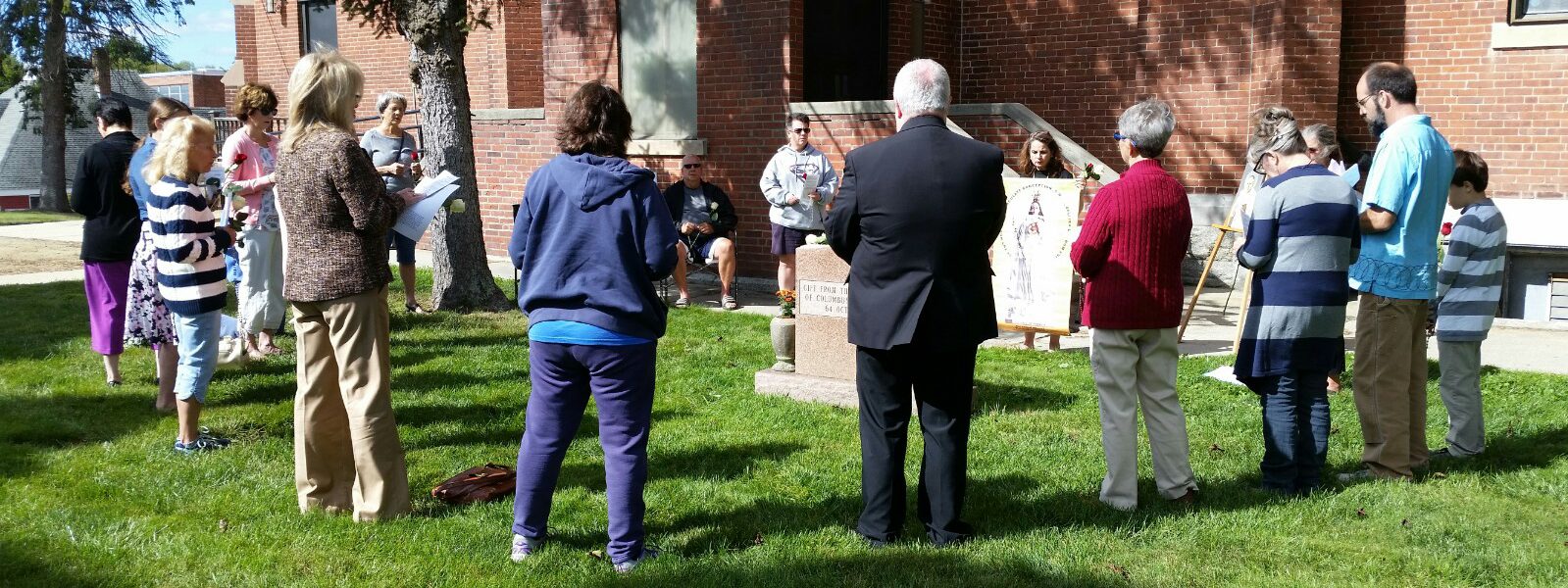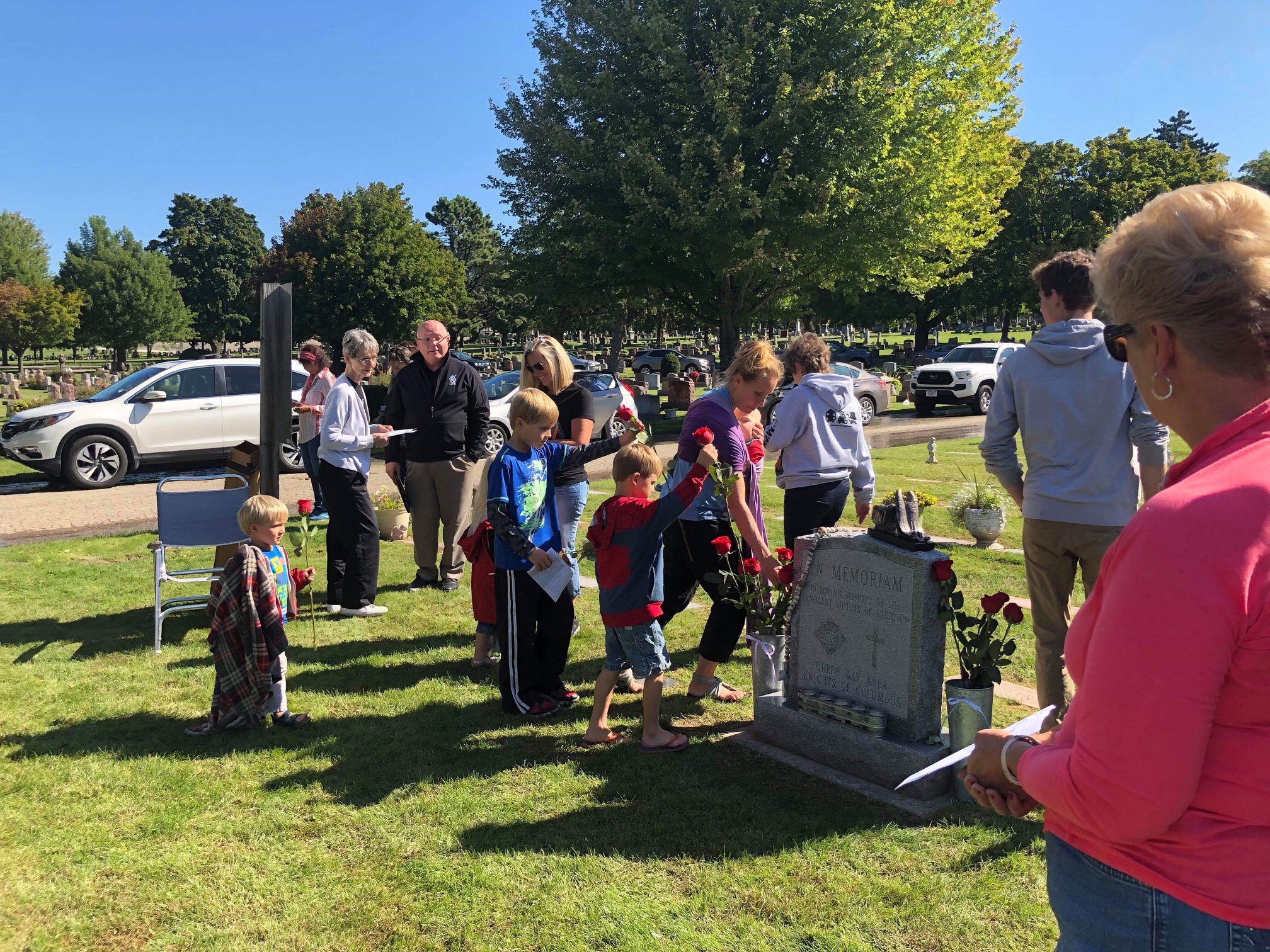It takes careful planning to hold any successful pro-life event, especially one as important as a National Day of Remembrance for Aborted Children memorial service. Some of these plans have to be laid out well in advance, while others will be finalized closer to the day of the event itself.
Advance preparations for the Day of Remembrance
Several key aspects of the Day of Remembrance have to be prepared well in advance. Special guest speakers will need to fit the memorial service into their schedules. Programs take time to print. Hunting down a stage and sound system may take some days.
Recruiting special guest speakers for your memorial service
Your memorial service will be most successful if you can recruit some engaging speakers and special guests from a variety of backgrounds. These guests could include:
- Well-known national figures
- Sports or entertainment celebrities
- The local Catholic bishop (see Inviting the local Catholic bishop to attend your memorial service)
- Other clergy (priests, Protestant ministers, Jewish rabbis, other religious leaders)
- Pro-life leaders
- Women who have had abortions (contact Silent No More Awareness Campaign for help finding a speaker in your area)
- Women who were turned away from abortion
- Pro-life officeholders or candidates
- Local radio or TV personalities
Go to the highest person you can to attempt to secure the speaker. For example, don’t call the diocese’s main office if you want the bishop to speak at your memorial service; find his personal secretary and start there.
Ask friends of different faiths for the names of good candidates from their tradition or community.
You may also wish to include special music in your program, in which case you will need to recruit musicians—whether someone to lead the whole gathering in song or an individual or group presenting an appropriate piece of music. Any music used should maintain the somber but hopeful tone apropriate to a memorial service.
Remember, any busy public person will have their schedules booked well in advance, so start making calls for guests immediately.
Speaker Contact Info: As you recruit speakers for your memorial service, be sure to get complete contact information for each, so you can stay in touch as the Day of Remembrance approaches. It’s especially important to have a mobile phone number for each speaker, in case you need to find them in the crowd on the day of the event.
Speaker Follow-up: A few days before the Day of Remembrance, contact each speaker by phone or email to remind them about the event and let them know where they fit into the program.
Memorial service stage and sound system
Memorial Service Stage: You are not likely to need a stage for your memorial service, but some sort of raised platform might be advantageous if you’re expecting a larger crowd.
A competent volunteer carpenter might be willing to build a simple wooden stage raised a foot or two off the ground. Stage platforms are also fairly inexpensive to rent from a local rental facility.
Sound System: Depending on the size of your memorial service, may need to employ a sound system.
For a larger crowd—say, 100 or more—a public address system (P.A.) is ideal. Your church, local pro-life group or civic organization may have one you can borrow, or you can rent a P.A. from a local rental company or music store.
For a smaller crowd a megaphone, also called a “bullhorn,” will suffice. Local pro-life activists may have one you can borrow, or you can buy one for about $50 on Amazon.
In a pinch, especially if amplification is not allowed, multiple walkie-talkies can be strategically distributed throughout the crowd to broadcast the event from the stage.
Your memorial service plan and program
With the advanced planning accomplished—or well underway—it’s time to turn to the specific details for the Day of Remembrance itself:
When to hold your memorial service
Date: The 2024 National Day of Remembrance for Aborted Children is scheduled for Saturday, September 14th. Every effort should be made to host your memorial service on this day, to compound the national impact of the event. If you need to hold your service on another date, please contact the national team.
Time: The target start time for Day of Remembrance memorial services is 1:00 p.m. local time. However, such factors as the schedules of your special guests or the availability of your memorial site may require you to choose a different starting time. But it is suggested that you hold your service in the afternoon, since many pro-life activists devote their Saturday mornings to prayer and counseling at the local abortion facility.
Special jobs to assign to your helpers
Several of these jobs are important enough to be explained in greater detail below or in other sections of the Leadership Resources (follow the links in this list):
- Master of Ceremonies (M.C.) to keep the program moving smoothly (this could be you)
- Photographer to shoot lots of pictures of the service, attendees, passersby, etc.
- Videographer to shoot footage of the service and (optionally) record interviews
- Media Liaison to whom all inquiries from reporters will be refered
- Head Counter to take an accurate count of how many people attend the memorial service (including infants and children!)
Outlining the memorial service program and M.C. role
There are two keys to ensuring your memorial service runs smoothly: (1) choose a good Master of Ceremonies (M.C.) and (2) put together an exciting, focused, detailed agenda.
Quite likely you, as local leader, would be the most appropriate M.C. Other options include another member of your leadership team or a local Christian radio personality.
The M.C. will be responsible for calling the memorial service to order and introducing and transitioning between each speaker, singer or other portion of your service.
There is no single “right way” to do a graveside memorial service—but here is a rough outline with some suggested activities to include in your service:
- Greeting and welcome by the M.C.
- Procession from a chapel or church (or other gathering place) to the memorial marker
- Opening hymn
- Scripture readings (see this list of suggested readings [PDF])
- Reflection on the readings by a spiritual leader
- Note the number of abortions in the year for which data is available in your county. Numbers of abortions in your state or the country could also be noted.
- Special guest speaker(s)
- Special guest musician(s)
- Placement of flowers or baby toys on the memorial or grave marker (children would be ideal for this task)
- A moment of silence for private prayer
- A Rosary or other group prayer
- Clergy blessing of the gravesite or memorial
- Recommendation of post-abortion ministries (such as Project Rachel and Rachel’s Vineyard) for anyone in need of healing or counseling
- Closing hymn or prayer
Break up the elements of the program to keep it interesting—for example, separate talks and prayers with hymns and other activities.
Draw out a detailed agenda for the memorial service, with each item—the opening and closing prayers, each individual speaker, every hymn or song or other activity—spelled out, in order, with the time alloted to each.
It’s also a good idea to factor in some “slop” time—for example, a few more minutes for each speaker than you really need—so that you don’t fall behind.
Share the agenda with your special guests in advance so they know where they fit into the program. However, it’s best not to tell them exactly when they’re speaking, lest any delay in the program cause them to become impatient. But do let each guest how long you expect them to have the stage.
Prayers and hymns for the memorial service
You are encouraged to ask clergy to offer opening and closing prayers for your memorial service. You may wish to have prayers offered by clergy of different faith traditions—for example, a Catholic priest and a Protestant pastor.
The clergy you ask to offer prayers may wish to compose their own, or you may choose to use any of the following prayers composed especially for the Day of Remembrance:
- Prayer for the Mothers of the Victims of Abortion [PDF]
- Memorial Service Opening Prayer [PDF]
- Prayer at a Gravesite or Memorial Site [PDF]
- Prayer for Those who Have Lost a Child to Abortion [PDF]
- Prayer of Mourning for Victims of Abortion [PDF]
- Prayer of Mourning for the Victims of Abortion (en español) [PDF]
- Memorial Service Opening Prayer (en español) [PDF]
- Prayer at a Gravesite or Memorial Site (en español) [PDF]
- Prayer for Those who Have Lost a Child to Abortion (en español) [PDF]
It’s a great idea to include some songs in your memorial service, whether sung corporately or reverently sung or played by a soloist or group. Be sure to choose songs and hymns with an appropriately solemn, hopeful tone. Provide a handout with the words of any group prayer, hymn or song.
Several appropriate hymns have been composed into printable PDFs for use at your memorial service which you can download below:
- Amazing Grace [PDF] (Hear this hymn on Youtube)
- Be Thou My Vision [PDF] (Hear this hymn on Youtube)
- Giver of Life [PDF]
- Immortal Invisible [PDF] (Hear this hymn on Youtube)
- The Lord Hears the Cry of the Poor [PDF] (Hear this hymn on Youtube)
- They’ll Know We Are Christians By Our Love [PDF] (Hear this hymn on Youtube)
- What Wondrous Love Is This [PDF] (Hear this hymn on Youtube)
- Where Charity and Love Prevail [PDF] (Hear this hymn on Youtube)

